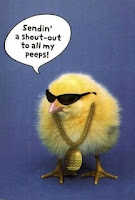I got tagged by
Minus the Spine and
LitLove for two memes, so, without further ado, here they are. Happy Friday!
Five Kind Things MemeThe rules:
1. List five kind things you do for yourself.
2.List five kind things you do for your closest friend, partner or child.
3.List five kind things you have done for a stranger.
4. Have fun!
5. Tag five people.
Five Kind Things I Do For Myself1. Read. Well, duh. But reading does so many things for me: Entertains, enlightens, informs. And keeps my brain well-oiled.
2. Blog breaks. Okay, I take blog breaks at work. When I'm at my wits' end or otherwise need a breath of fresh air, I post or peruse my blogroll.
3. Hang with my kitties. When my cats sprawl on top of me as I watch TV or read, I think they soak up all angst.
4. Go to Buddhist meditations and lectures. I just started this in earnest, as what I have been going through with my parents finally pried open my completely locked spiritual door. Catholicism hasn't worked for me since second grade, and I want and need some sort of spiritual grounding. Buddhism gives me peace.
5. Call my friends. I am not a big one on reaching out (who wants to bother other people?), but my friends are always there for me. That has been a big comfort.
Five Kind Things I Do For My Good Friends1. Listen to them. At least, I hope I do. I make every effort, and even that is not enough. Listening to someone is the best you can do, and it's the hardest oftentimes.
2. Encourage them. I am not really great at giving them my time, but I do have lots of energy and ideas for when they hit their walls.
3. Loan them money. I'm not rich, and I'm certainly not philanthropic, but I don't hesitate when my friends need to borrow. And I'm not a nag about payback (I don't keep very good track, but the kind of people who are my friends are very scrupulous about paying back.) I think this is not only because it helps my friends and I'm not a money-grubber, but also because it's a way to give and I'm not good about giving time.
4. Don't hold grudges. If you've ever been close to grudge-holders, well, you know that this is the gift that keeps on giving.
5. Make them laugh. I don't think anyone can do this enough, and I need to work harder at this, but we do have fun and laugh, my friends and I.
Five Kind Things I Have Done For Strangers1. Give money. That's pretty easy.
2. Give directions and even help them to their destination, if I can. (I'm not great at directions myself, so this is a trick.)
3. Compliment them. Sometimes, if someone looks like they could use a boost or even when they can't, a nice word goes a long way.
4. Give them advice. Sometimes friends have asked me to help their friends, and usually it involves writing or careers.
5. Let them have the seat.
Three things I had to Learn the Hard Way1. "You can't get crucified for what you don't say." Still learning that one.
2. "Don't sleep with a man on the first date." Still learning that one.
3. "Mud too thick doesn't stick." An old Polish saying, which I think relates to peasants and hut-building. Nevertheless, it means when people get intimate too fast, it usually falls apart or doesn't last. This relates to point #2 very well. Still learning this one.
Tag (take your pick of the meme): Dorothy W., Iliana, Verbivore, Minus Spine (for the 5 Things), and Dark Orpheus.











